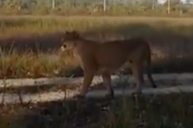Each year more and more species are getting closer to extinction. It seems that we are constantly adding new names to the endangered species list and it is truly saddening. Now, Florida panthers are dying at an alarming rate. Will they be the next added to the list? Also, what is this unexpected killer that is taking such a toll on these big cats?
Florida Panthers Are Dying Due To Unexpected Killer

Getty Images
The NY Post shares that "the number of endangered panthers slaughtered in Florida has more than doubled this year." So far, in this year alone, 30 panthers have been killed. What is this mysterious and unexpected killer...drivers. Are you surprised? After all it is not uncommon for drivers to hit wildlife while driving, particularly on dark back roads.
However, we are more accustomed to seeing deer, fox, or squirrels rather than large cats. While panthers may not be the typical roadkill in other states, it Florida it is unfortunately becoming the norm. The most recent panther was killed on Friday near Naples. Reports shared that it was a 3.5-year-old male. The Florida fish and Wildlife Conservation Commission confirmed that the panther "showed trauma indicative of a vehicular collision."
This tragic death is not the first of its kind, Florida panthers are dying more and more often. The loss of this male panther comes just days after a female panther was struck and killed. Vehicle collisions are the leading cause of death for panthers in the Sunshine State. Furthermore, it is not just collisions with cars that are killing these precious creatures. Collisions with trains are also to blame, as well as encounters with other, natural predators.
The amount of panthers dying in Florida this year is more than double what it was in 2023. As if losing life wasn't horrible enough, these numbers are concerning for another reason. The Post shares, "The rising death tool would be debilitating for the species, which is listed as critically endangered in the state." Records show there are only about 200 wild Florida panthers left. With numbers like these, experts fear this incredible species could soon be lost to us forever.




